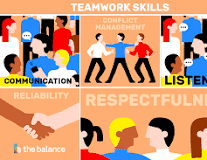Teamwork Skills Examples
Teamwork is a crucial aspect of success in many areas of life, from the workplace to sports teams and community projects. Effective teamwork involves collaboration, communication, and a shared commitment to achieving common goals. Here are some examples of key teamwork skills:
Communication
Clear and open communication is essential for effective teamwork. Team members should be able to express their ideas, listen actively to others, and provide feedback constructively. Good communicators help ensure that everyone is on the same page and working towards the same objectives.
Collaboration
Collaboration involves working together towards a common goal, leveraging each team member’s strengths and expertise. Successful collaboration requires trust, respect, and a willingness to compromise when necessary. By pooling resources and skills, teams can achieve more than individuals working alone.
Problem-Solving
Teams often face challenges or obstacles that require creative problem-solving skills. Effective teamwork involves identifying issues, brainstorming solutions collectively, and implementing strategies to overcome difficulties. Strong problem-solvers within a team can help navigate complex situations and find innovative ways forward.
Adaptability
In today’s fast-paced world, adaptability is a valuable teamwork skill. Team members who can adjust to changing circumstances, embrace new ideas, and remain flexible in their approach contribute to the team’s overall resilience. Being open to change helps teams stay agile and responsive in dynamic environments.
Leadership
While teamwork emphasises collaboration among equals, leadership skills are also important within a team setting. Strong leaders can inspire and motivate their teammates, delegate tasks effectively, and provide direction when needed. Leadership qualities such as decisiveness, empathy, and integrity can enhance team dynamics and drive success.
In conclusion, mastering teamwork skills is essential for achieving shared goals and fostering a positive working environment. By developing communication abilities, promoting collaboration, honing problem-solving techniques, embracing adaptability, and cultivating leadership qualities within teams, individuals can enhance their collective effectiveness and achieve outstanding results.
Essential Teamwork Skills: Communication, Collaboration, Problem-Solving, Adaptability, and Leadership
- What are some examples of teamwork skills?
- How can communication skills benefit teamwork?
- What is the importance of collaboration in teamwork?
- How do problem-solving skills contribute to effective teamwork?
- Why is adaptability considered a key teamwork skill?
- What leadership qualities are valuable for successful team dynamics?
What are some examples of teamwork skills?
When asked about examples of teamwork skills, it is important to highlight key attributes that contribute to successful collaboration within a team. Effective communication, the ability to work collaboratively towards common goals, adept problem-solving capabilities, adaptability to changing circumstances, and strong leadership qualities are all essential examples of teamwork skills. By demonstrating these skills, team members can enhance their collective effectiveness and achieve outstanding results in various endeavours.
How can communication skills benefit teamwork?
Effective communication skills play a pivotal role in enhancing teamwork dynamics and productivity. Clear and open communication fosters understanding among team members, ensuring that everyone is aligned with the team’s goals and objectives. By articulating ideas, listening actively to others, and providing feedback constructively, team members can collaborate more efficiently and resolve conflicts effectively. Strong communication skills promote transparency, trust, and camaraderie within the team, leading to improved decision-making processes and overall performance. In essence, communication skills form the foundation of successful teamwork by facilitating information sharing, idea exchange, and mutual support among team members.
What is the importance of collaboration in teamwork?
Collaboration plays a pivotal role in the success of teamwork by fostering synergy among team members and leveraging their diverse skills and perspectives towards achieving common goals. Effective collaboration encourages open communication, mutual respect, and shared ownership of tasks, leading to increased productivity and innovative problem-solving. By working together harmoniously, team members can combine their individual strengths to overcome challenges, generate creative ideas, and achieve outcomes that surpass what could be accomplished individually. Ultimately, collaboration in teamwork cultivates a supportive and cohesive environment where trust is built, relationships are strengthened, and collective achievements are celebrated.
How do problem-solving skills contribute to effective teamwork?
Problem-solving skills play a vital role in contributing to effective teamwork by enabling team members to navigate challenges and obstacles collectively. When team members possess strong problem-solving abilities, they can identify issues efficiently, brainstorm creative solutions collaboratively, and implement strategies to overcome hurdles effectively. By fostering a problem-solving mindset within the team, members can work together to find innovative ways to address complex problems, leading to improved decision-making, enhanced productivity, and strengthened team cohesion. Ultimately, problem-solving skills empower teams to adapt to changing circumstances, resolve conflicts constructively, and achieve shared goals successfully through a collaborative and solution-oriented approach.
Why is adaptability considered a key teamwork skill?
Adaptability is considered a key teamwork skill due to its ability to enhance a team’s resilience and effectiveness in dynamic environments. In today’s rapidly changing world, teams often encounter unexpected challenges or shifting circumstances that require quick adjustments and innovative solutions. Team members who demonstrate adaptability can easily pivot, embrace change, and remain flexible in their approach, enabling the team to navigate obstacles smoothly and maintain productivity. By being open to new ideas, willing to learn and adapt, and adept at handling uncertainties, individuals with strong adaptability skills contribute significantly to a team’s ability to thrive amidst uncertainty and complexity.
What leadership qualities are valuable for successful team dynamics?
When considering valuable leadership qualities for successful team dynamics, several key attributes come to mind. Firstly, effective communication skills are essential for a leader to convey goals clearly, listen actively to team members’ input, and foster open dialogue within the group. Additionally, strong decision-making abilities enable leaders to make informed choices promptly, guiding the team towards achieving objectives efficiently. Empathy is another crucial quality as it allows leaders to understand and support their team members’ needs, building trust and camaraderie. Lastly, integrity plays a vital role in maintaining ethical standards and inspiring respect among team members, contributing to a positive and cohesive working environment conducive to success.

